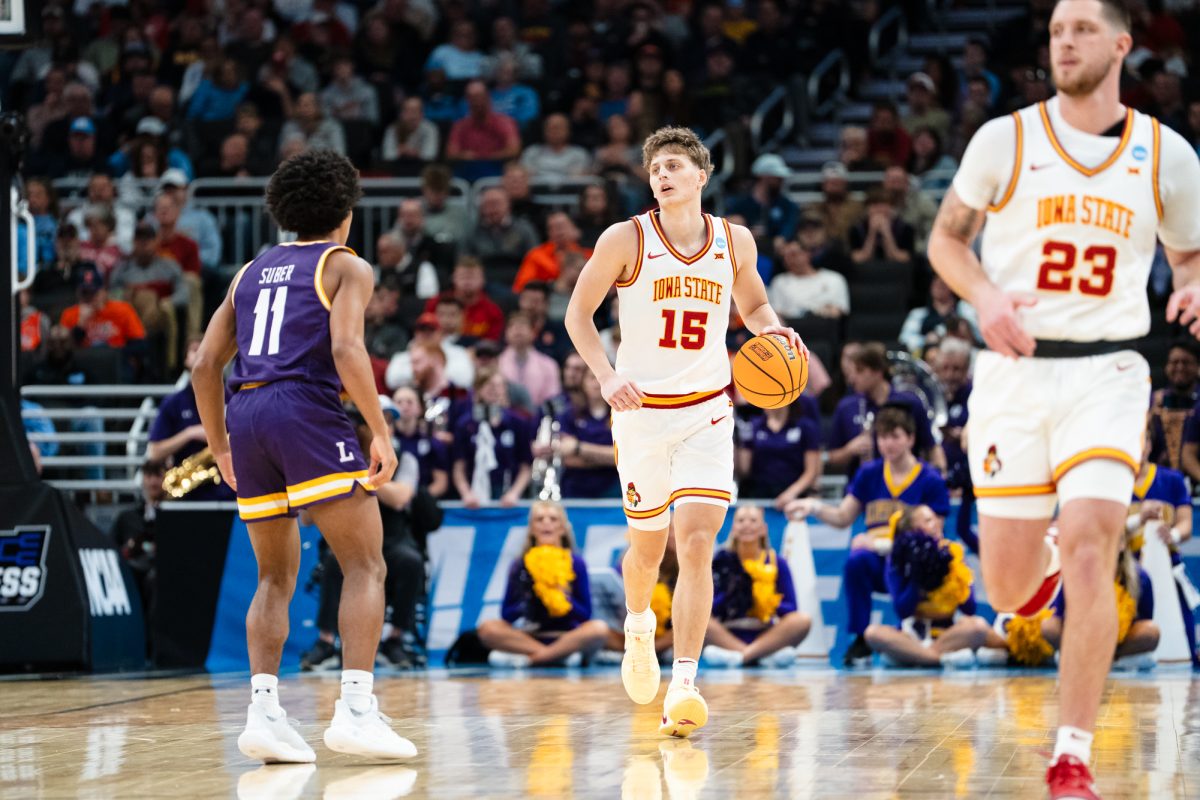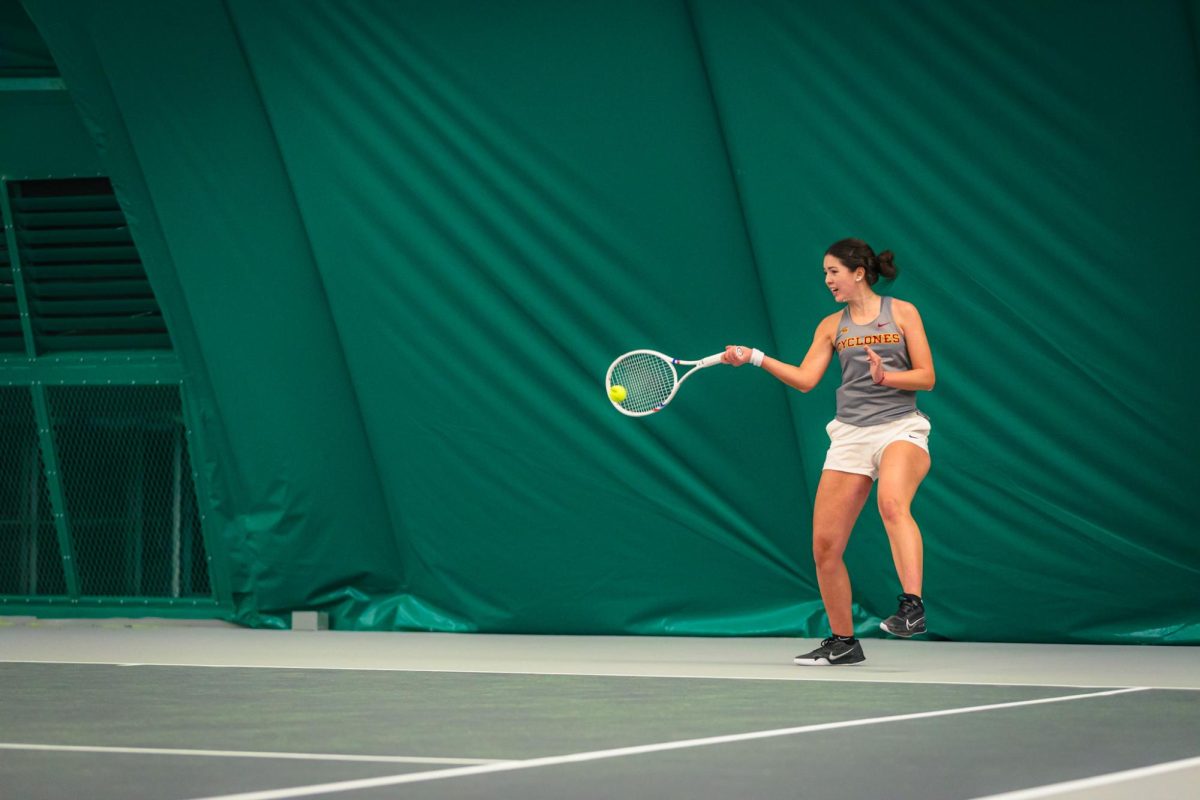Otz, Carper, Fennelly and ISU cooperation
November 8, 2015
Josh Carper and Billy Fennelly saw it coming.
The two future Iowa State employees — unaware of each other at the time — were faced with an unfortunate truth that haunts so many young, soon-to-be former athletes as they barrel toward the end of their senior years.
When high school was over, so were their athletic careers.
“I’ll blame the end of my career on my heart defect because, of course, I’d be in the NBA without it,” Billy laughed.
Carper had no medical issue to paint as the culprit for his athletic demise, except for maybe flat feet, which seem so commonly to afflict Iowa natives. Still he knew, as did Fennelly, that they wanted basketball to remain a central focus in their lives.
Carper, the director of operations for the ISU women’s basketball team for the last eight seasons, started college in 2003, using his connections to his high school coaches to get hired on as a student manager with the men’s team at Iowa State.
Billy, who has served as an assistant coach on the women’s team for the last five seasons, defected his freshman year to Iowa City. He returned to Ames in 2004 and took a student manager’s job on the women’s side, working for his father, ISU coach Bill Fennelly.
It was then, in their sophomore year of college, that Billy and Carper bonded through mutual interest despite working for different ISU teams. Their relationship epitomized a cooperation between the men’s and women’s basketball programs at Iowa State — one that makes the hoops environment in Ames unique.
ISU men’s assistant coach and recruiting coordinator T.J. Otzelberger, who arrived on the ISU campus in 2006 and recently returned to Ames after two years coaching at Washington, noticed the cooperative nature between the men’s and women’s programs immediately — coming to miss it during his time on the West Coast.
“A lot of places, programs are competitive against each other, whether they’re fighting for gym time, fighting for attention, awards or accolades,” Otzelberger said. “I think this environment is unique because everybody is pulling for each other like we’re on the same team.”
Billy — who departed after graduation to coach at Maryland for a year, followed by two years in operations at Northwestern — also felt the pull to return to Ames for similar reasons.
“I grew up with this, but I was just some punk kid growing up spoiled rotten,” Billy said. “But you didn’t know you were spoiled rotten until you got a chance to go out and see other programs.”
Billy and Carper’s student jobs as managers were more demanding and time-intensive than the positions are today, and the excess of responsibility fell on the shoulders of fewer student employees.
On numerous nights, Carper edited film until the early-morning hours, showered and went to class on no sleep. Video had to be cut and there was no one else to do it. Team managers a decade ago were around the sixth man on the totem pole, Carper said. Now, because of an increase in staff numbers across the board, they could be as low as 15th.
Carper and Billy learned early on that dedication was the key to turning a college job into a career, and so they sacrificed. Their social lives suffered at the expense of their professional aspirations.
“Carp and I were clipping anything and everything from VHS to VHS,” Fennelly said. “Now, they don’t even use DVDs. Now the video work is already done if you subscribe to this service, and everybody does.”
But the grind wasn’t without its charms, and certainly wasn’t without its stories.
“We landed at 3 a.m. in New York and a coach’s newborn son needed food,” Carper said. “We were just a few 19-year-old kids wandering the streets of New York in the [early morning hours], a place none of us had ever been, searching for milk.”
Billy remembered another manager he and Carper befriended, referred to only as Mike from Chicago, who used to be tasked with mundane responsibilities, like tending to then-ISU men’s coach Wayne Morgan’s car. They were opportunities of which he took full advantage.
“He’d go fill up Wayne’s Escalade with gas, then he’d roll down the windows and roll down Welch [Avenue] bumping music,” Fennelly laughed. “He’d take at least one loop.”
Mostly for Carper and Billy, though, the perks were friendship and solidarity.
“Monday nights, we’d go to Old Chicago around 10 p.m., and we’d eat half price apps and drink cheap beer. We’d be writing plays down on a napkin,” Fennelly said. “We watched games and used ketchup bottles and salt shakers to set up plays on the table.”
The relationship fostered would prove crucial to Carper’s ability to remain in Ames and would serve as another example of inter-program cooperation and exchanegability.
Otzelberger arrived at Iowa State during Carper’s final year as a student manager. When the season ended, Carper hoped to remain on as a graduate assistant under new head coach Greg McDermott, but no graduate assistant job was available.
Otzelberger and McDermott instead created the position of associate of operations and kept Carper on staff. Needing a place to stay, Carper and Otzelberger became roommates.
“We felt like Josh was invaluable; we were trying to find out every way we could keep him,” Otzelberger said. “I obviously moved here single and had a bachelor pad, [so he moved in with me]. We were good friends, got a long well and it worked out for both of us, even though he had to live in a dungeon, basically.”
Otzelberger, influential as a Cyclone recruiter from the time of his hiring, spent a lot of time on the road, but had few concerns about leaving Carper unsupervised in his new home despite knowing him for only a year.
“Absolutely, I trusted him,” Otzelberger smiled. “I didn’t have anything for him to take.”
Carper spent nine months on a couch in an unfinished basement, eating takeout from The Café in North Ames and still hoping to continue his career with the men’s team. Then, Carper’s old friend Billy reached out.
Billy’s father had an open position for a director of basketball operations and an interest in the man, Carper, for whom the ISU men’s coaching staff fabricated a position just so he wouldn’t pull up stakes for another program.
“It’s just an appreciation for what the other people do on a daily basis,” Carper explained. “I switched from the men’s side to the women’s. There’s been a lot of that going back and forth — multiple others who started on one side and ended on the other.”
The seamless transitions and cooperation between programs, which share the Sukup Basketball Complex in West Ames, are only possible because the basketball departments function as a coherent community with open lines of communication and shared goals.
“When you’re not at Iowa State, you come to appreciate so much more the closeness with the staffs, the department, the people in the community, the walking out to Hilton Coliseum where you see how much people care and how important it is,” Otzelberger said. “You miss those things when you’re gone, and you appreciate it more when you’re back.”
Billy, who’s worked for three universities, more than Otzelberger’s two and Carper’s one, has the widest perspective — and couldn’t agree more.
“I’ve been to some really great places, but the support for Iowa State in Ames is honestly second to none,” Fennelly said. “My dad is on his sixth men’s coach since he’s been here. In terms of relationships with the men’s staff, the other two places I’ve been, I’ve never had a relationship like we’ve had here with [each] of the men’s coaches.”
The ISU basketball cooperative doesn’t just stop with administrative collaboration, career transitions from one side to the other or exchanged pleasantries while passing in the hall.
Coaches watch each others’ practices when possible, consult on plays, and Otzelberger said ISU forward Georges Niang probably spends as much time in the women’s gym at Sukup as he does in the men’s.
“Whoever the head coach has been, whether it’s been Mcdermott, Fred Hoiberg or Steve Prohm, they’ve kind of looked at Fennelly almost a little bit as a mentor,” Otzelberger said. “Coach Fennelly has been a head coach for 20 years, and he’s been highly successful for a long time.
“We’d be foolish to not capitalize on that.”






